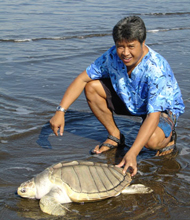| |
|
 |
The Religion Approach works for Turtles in Indonesia
October 19 2006:
 |
 |
 |
Ketut Sarjana Putra releases a three year old Olive Ridley turtle after tagging. Photo: Brian Hutchinson/CI. |
A Balinese environmentalist who has worked with local religious leaders to protect tens of thousands of rare turtles every year, yesterday received a major international award for his work.
Since the mid 1990s, Ketut Sarjana Putra – formerly employed by WWF-Indonesia, currently Marine Director for Conservation International in Indonesia – has spearheaded an astonishing campaign led by WWF to stop the practice of using sea turtles for Hindu ceremonies in Bali.
His story is an excellent model of how to work succesfully with faiths and faith communities to create change together.
He started by lobbying for a law to protect turtles throughout Indonesia, and a national law was created in 1999 to ban the harvest of turtles, with an exception made to the island of Bali to allow the capture of 5,000 turtles a year for consumption in religious ceremonies.
 |
| "Do not use anything belonging to nature, such as oil, coal, or forest, at a greater rate than you can replenish it. For example, do not destroy birds, fish, earthworms, and even bacteria which play vital ecological roles; once they are annihilated you cannot recreate them. Thus only can you avoid becoming bankrupt, and the life cycle can continue for a long, long time." Hindu statement on creation. |
|
 |
 |
However after learning that the quota was being exceeded seven-fold, he decided to try and work with Balinese government officials to remove the quota altogether – reasoning with them that tourism, Bali's main form of revenue, was going to suffer if it was known that 35,000 turtles were slaughtered there every year. He suggested that turtles could only be used in religious ceremonies with a permit and recommendation from a Balinese priest; and furthermore, that only Green turtles less than 60cm long could be used (because he knew that juvenile Green turtles are hard to find.) The new law was passed in 2000.
Meanwhile, Putra knew that he also had to create a solution that was acceptable to the Hindu faith community, so he also recruited the help of a priest in the region of Sanur in Bali to help him understand better the nuances of Balinese Hindu theology. Using this knowledge he gently persuaded 37 local Hindu leaders to ban turtle meat from their ceremonies, appearing on local TV each week to inform the public of the plight of sea turtles.
In 2001, his life was threatened when a powerful turtle trader organized a mob of 300 protestors at the WWF office in Denpasar. He asked his staff to leave for their own protection - and sent his wife to stay in a village away from the city.
Today there is virtually no evidence of a turtle trade and turtle meat is no longer consumed in Balinese ceremonies. Instead, if the Balinese find a turtle on the beach, they make a ceremony for it and turn it back to the sea.
Ketut Sarjana Putra was awarded the $10,000 Seacology prize at a ceremony in San Francisco on October 18. The prize is awarded annually to an indigenous islander for exceptional achievement in preserving the environment.
Seacology is a nonprofit, nongovernmental organization with the sole purpose of preserving the environments and cultures of islands throughout the globe.
Link here for an article about religions and environment written by Conservation International in Indonesia. Conservation International started the mission with conservation and religion in 2005, with a grant from the World Bank, and in Indonesia is working mainly with Islamic Communities.
Link here for the WWF Indonesia website, giving the latest news about WWF's other conservation projects in the region. A Bahasa Indonesia language version of this site is also available here.
|
 |
 |
|
|
|
|
|
 |
Hindu Statement on Ecology
A formal statement on Hindu beliefs about the environment. "God’s creation is sacred. Humanity does not have the right to destroy what it cannot create." |
 |
Multi-faith environment meeting in Bogor
Indonesia's first multi-faith meeting on the environment was held at Bogor on 18th December 2002. |
 |
May 14 2007:
Whales, turtles and timber: news from Indonesia
It is saving whales in Nusa Tenggara Province, it has protected rare turtles on Bali Island, and it is encouraging the use of sustainable timber in Aceh Province… The “religions approach” is being applied to conservation projects all over Indonesia, and it seems that in many places we are beginning to see successes. |
 |
 |
|
|

